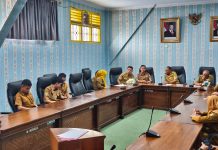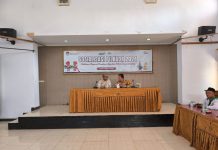Amanda de Cadenet. If you are of a certain vintage, that name will probably bring back a Proustian rush of sensory memories: Impulse Vanilla Kisses body spray, the feel of a Primal Scream Screamadelica cassette in your hands, the taste of Hooch on your tongue – all the greatest hits of 1990s Britain. At only 18, De Cadenet was one of the hosts on the cult Channel 4 late-night show The Word, and images of her in all her messy teenage glory, with chunky blond hair falling around her shoulders and tights always ripped, were everywhere. The tabloids gleefully tutted at the careening nightlife antics of the “wild child”, as they invariably called her.
When she was 20, she ran off to the US with John Taylor of Duran Duran soon after she had their daughter, Atlanta. Despite the doomsayers’ predictions, she did not become another show-business casualty: she and Taylor broke up but remain friends, and she later married Nick Valensi from the Strokes and had twins. Her professional career was even more surprising as she became a portrait photographer for glossy magazines – and a good one.
De Cadenet and John Taylor at Heathrow airport in 1991. Photograph: Dennis Stone/Shutterstock
Most unexpectedly, De Cadenet became a prominent feminist activist in the US. In 2012, she launched The Conversation, a TV talkshow that became a podcast, on which she interviewed well-known women, from Lady Gaga to Gwyneth Paltrow to Hillary Clinton. Less a formal chatshow than an informal natter – with De Cadenet often casually leaning her head on her fist – The Conversation showcased her real strength at eliciting intimacy from subjects with her disarming warmth. In 2016, she founded Girlgaze, a platform that connects female creatives with corporations and brands.
Girlgaze: a feminist photobook edited by De Cadenet.
We are talking today because she is about to launch About the Men, an offshoot podcast of The Conversation, on which she interviews – yes – men, including Matthew McConaughey and Mike Tyson, about issues such as consent and feminism. These are subjects De Cadenet has long discussed on social media, where she has a huge following, and is especially active in posting about women’s rights.
While I have always admired her effort, initially it felt a little odd to watch a video on Instagram in which De Cadenet earnestly talked about sexual harassment, as if Lindsay Lohan was teaching me about Marxism.
Such snarkiness was a reflection of my own limitations rather than De Cadenet’s, and I was being as bad as the 90s tabloids, dismissing her with the most reductive of cliches. The Conversation has now aired in 18 countries, and De Cadenet’s 2018 memoir, It’s Messy: On Boys, Boobs, and Badass Women, amply demonstrated that she has had extensive personal experience with many of the issues – abortion, sexual assault – that she discusses. Her early career, which had once made me doubt her credibility, in fact uniquely qualifies her to address these issues.
Amanda de Cadenet and Terry Christian in a promo shot for The Word. Photograph: Channel 4
“I think I became a photographer because of my own experience of being objectified and sexualised, and I wanted to show something other than a male gaze,” she says. “So when it came to telling women’s stories on The Conversation, I really remembered what it was like when I was famous in the 90s and there was some heinous headline about me in the Sun or the News of the World. There was no social media then so I couldn’t respond, and that feeling of being muzzled and misrepresented was so intense. So I had this really burning desire to represent people truthfully.”
De Cadenet is talking by video call from her home office, which is her newly done-up garage in Los Angeles. She has been in the US for so long that she pronounces it gar-AGE, having fled London 30 years ago, after a UK tabloid ran photos of her breastfeeding baby Atlanta.
“I could not get out of the country fast enough,” she says. “I left laundry in the hamper and food in the fridge. I just could not live with headlines saying how fat I was, ‘the demise of Amanda de Cadenet’, now a fat, milk-leaking-tits mother, how I had nothing any more because I was no longer fuckable. I was so young and being bullied by the tabloids scarred me. I think it took me 20 years to recover from it,” she says.
Eliciting intimacy with disarming warmth … De Cadenet with Lady Gaga on The Conversation in 2011.
Aside from the transatlantic accent, De Cadenet is not very different from how fans of The Word remember her. She was always a charismatic interviewer, unfazed by the celebrities she spoke to – River Phoenix, Keanu Reeves – in the way only an extremely cool teenager can be.
Today, she has a very engaging way about her, chatting as though we’re two girlfriends having a catch-up and making a point of using my name frequently (“Honestly, Hadley, it was a total mindfuck,” she says, recalling her teenage fame). She is thoughtful and likable, two qualities no one associated with her back in the 90s, when she was portrayed in the media and on TV as a lightweight Lolita. “To some degree, I played into that, because I was like: ‘Oh this seems to work. This is the access point,’” she says.
De Cadenet with Bo Derek on The Word in 1991. Photograph: Trinity Mirror/Mirrorpix/Alamy
In retrospect, it’s obvious that De Cadenet was a precursor to late-90s girls such as Lohan, Britney Spears and Paris Hilton, who were similarly derided for behaving like what they were: teenagers with a woeful lack of supervision. And yet, I say, unlike so many others, she emerged unscathed.
“Oh, I was not unscathed,” she quickly corrects me. “I was badly scathed, and if I had stayed in the UK, I really don’t think I’d be alive today, because I had such PTSD and depression.”
What makes De Cadenet’s stability today even more remarkable is that before drunken photos of her were being printed in the tabloids when she was 16, her life was already astonishingly unstable. She was born into privilege, as the daughter of the glamorous racing car driver Alain de Cadenet and Anna, a fashion model. But her parents split up when she was nine and her mother struggled to cope on her own.
De Cadenet writes in It’s Messy that she started having sex when she was barely a teenager, and describes one particular night when she was 15: “I was lying on a mattress in the attic of a squat wearing nothing but my socks and trying to get my mind to stop racing after a night of drug use, when I heard a huge crash downstairs. Police burst into the room; someone shone a bright light into my face then threw a rough blanket around me to cover my naked body. Before I could register what was happening, I was bundled down the stairs, my hands handcuffed behind my back and thrown in the back of a van.”
De Cadenet was made a ward of court and put in care for seven months. “That was traumatic. But what I learned was my trauma was not special – I felt the same as the kids in the children’s home, no matter how different my life had been. If you ask anyone, they will have a story, and they’ll have dealt with different levels of trauma,” she says.
She is currently working on a scripted series about her life and has been reading her social worker’s notes from this time.
Courtney Love and De Cadenet at a Vanity Fair Oscar party in 1995. Photograph: Tammie Arroyo/Getty Images
“It’s just sad, reading what they observed in me. And it really brings back what I felt then, and I wouldn’t wish that on anyone,” she says.
After she got out of the home, she – incredibly – was invited to host The Word. How on earth did that happen?
“It was a very murky time for me and it’s hard for me to remember exact dates. I had done some modelling before I went into the home, so there was some publicity around that and I think the producers of The Word were like: ‘Who is this girl?’ And thank God, because I needed a job.”
So, she went from being in care to being extremely famous and pilloried in the press?
“Exactly. How can a teenage brain handle that? It can’t. So no wonder I did a lot of drugs and drank a lot.”
De Cadenet also worked on The Big Breakfast and, like The Word, it had a rambunctious, ramshackle charm that made it feel extremely original. Does she not think now, in retrospect, it was quite weird that she was hosting national TV shows when she was so young?
Atlanta de Cadenet Taylor and Amanda de Cadenet attend the #Teampixel x Girlgaze launch event in Los Angeles in 2017. Photograph: Emma McIntyre/Getty Images for Google
She slightly ducks the question: “Well, as an adult, I can look back and say: ‘That was very smart casting.’ And I’m super grateful that they gave me that opportunity because I wouldn’t have the life I’ve had otherwise.”
The Word also introduced her to her near-lifelong best friend: no, not her co-host Terry Christian (bad news, Word aficionados, she and Christian did not stay in touch). Instead, it was Keanu Reeves, who she interviewed on air while two months pregnant with Atlanta. “Within minutes of laying eyes on him, I remember thinking: ‘I wonder how many pregnant women have affairs?’” she writes in It’s Messy. Reeves gently rebuffed her (understandable) advances because, she writes, “he is a man of hardcore ethics”. But they did date after she broke up with Taylor a few years later when she was 26. What’s Reeves like as a boyfriend?
Keanu Reeves is a part of my extended family and I’m really grateful for that
She hesitates for about 10 seconds before answering: “I’m very protective of his privacy. But I will say that he’s a very kind, authentic person, and he’s the most unfamous famous person ever, by which I mean he has been able to maintain that balance, which is very hard. He’s a part of my extended family and I’m really grateful for that,” she says.
With daughter Atlanta in 1993. Photograph: DMI/The Life Picture Collection/Shutterstock
She credits Atlanta with saving her life, because getting pregnant forced her to get clean, and she has stayed that way since, even through her break-up from Taylor. She then met Nick Valensi at a Strokes concert. She was 28, he had just turned 21 and their wildly successful debut album, This Is It, had just been released. “I said to him: ‘Look, go out, do a bunch of supermodels while your band is hot, because your next album won’t do as well, and then get back to me.’ But he said: ‘No, I don’t want to, because I’ll never meet someone like you again.’”
‘He became a father at 24 and he had never held a baby before he held his twins’ … Nick Valensi of the Strokes. Photograph: Amanda de Cadenet
They recently celebrated the 20th anniversary of when they met, while their twins, Silvan and Ella, are 15.
“My best friend [Reeves] and especially my husband helped to restore my faith in men, because it’s really unusual for a young man in that profession to choose to be in a marriage. I mean, he became a father at 24 and he had never held a baby before he held his twins.”
Didn’t it drive her crazy that she had to look after infant twins while he was on tour?
“No, I had the opposite problem, because he took a sabbatical from the Strokes so he could be a present father. So, suddenly I had a husband at home 24/7 who was like: ‘It’s time to feed them again, and can you express extra milk because this one didn’t get enough last time?’ I was like: ‘Oh my God, can you go on tour again, please?’”
There are definitely things I wish I could change, like all the times I felt maybe I really wouldn’t be OK
It was from conversations with her husband and son, Silvan, she says, that she was inspired to launch About the Men. She realised that men “have been extremely affected by the cultural reckonings of the past few years, and I wanted to know where they’re at. So, while I deeply know that women need to have their own space, I also think involving men in some of the conversations will help to move the dialogue forward for women,” she says in the heartfelt tone she uses whenever discussing her work. And who can blame her? Once she was mocked as a lightweight. Anyone who sneers at her for taking herself seriously now is merely showing their own shallowness.
How does she feel now, from the position of being a feminist activist, when she looks back on how exploited she was when she was young?
“I have enormous compassion for myself at that age,” she says. “There are definitely things I wish I could change, like all the times I felt maybe I really wouldn’t be OK, that I wasn’t going to get through this. But I did get through it, and I wouldn’t change much because I got here, and it’s good.”
For more information on About the Men, go to amandadecadenet.com
The post ‘I could not get out of Britain fast enough’: Amanda de Cadenet on tabloid bullies, teenage fame and making it in the US first appeared on Eatory.my.id.

















